-
Product Name
IkB alpha antibody
- Documents
-
Description
IkB alpha Rabbit Polyclonal antibody. Positive IHC detected in human ovary tumor tissue, human prostate cancer tissue. Positive IF detected in Hela cells. Positive FC detected in HeLa cells, NIH/3T3 cells. Positive IP detected in HeLa cells. Positive WB detected in HeLa cells, A431 cells, HEK-293 cells, HL-60 cells, Jurkat cells, mouse liver tissue, NIH/3T3 cells, pig liver tissue. Observed molecular weight by Western-blot: 36-40 kDa
-
Tested applications
ELISA, IHC, IF, WB, FC, IP
-
Species reactivity
Human,Mouse,Rat, Pig; other species not tested.
-
Alternative names
I kappa B alpha antibody; IkappaBalpha antibody; IkB alpha antibody; IKBA antibody; MAD 3 antibody; MAD3 antibody; NF kappa B inhibitor alpha antibody; NFKBI antibody; NFKBIA antibody
-
Isotype
Rabbit IgG
-
Preparation
This antibody was obtained by immunization of IkB alpha recombinant protein (Accession Number: NM_020529). Purification method: Antigen affinity purified.
-
Clonality
Polyclonal
-
Formulation
PBS with 0.1% sodium azide and 50% glycerol pH 7.3.
-
Storage instructions
Store at -20℃. DO NOT ALIQUOT
-
Applications
Recommended Dilution:
WB: 1:200-1:2000
IP: 1:500-1:5000
IHC: 1:20-1:200
IF: 1:10-1:100
-
Validations
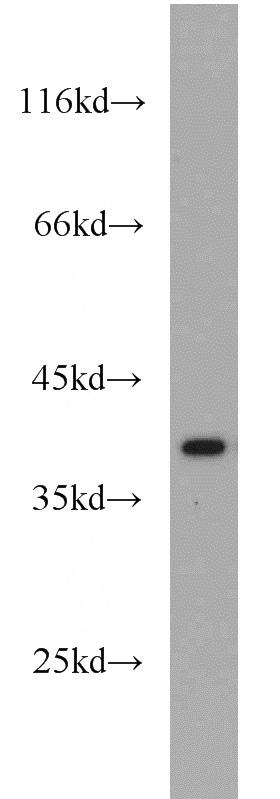
HeLa cells were subjected to SDS PAGE followed by western blot with Catalog No:111639(NFKBIA antibody) at dilution of 1:500
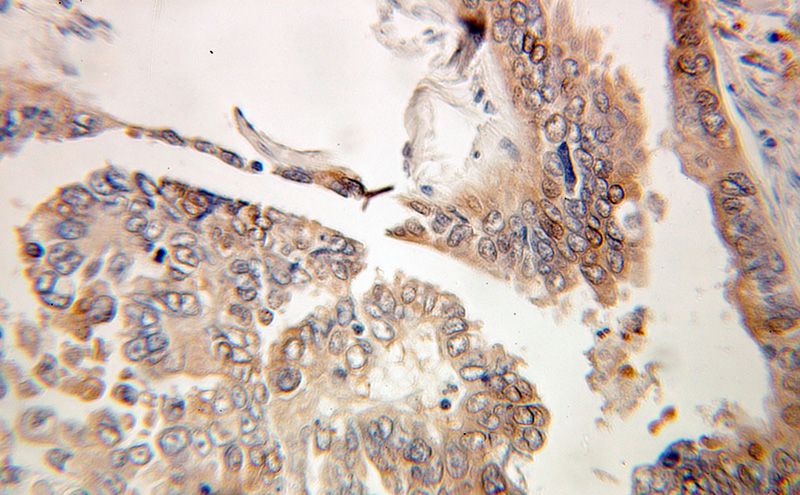
Immunohistochemical of paraffin-embedded human ovary tumor using Catalog No:111639(NFKBIA antibody) at dilution of 1:100 (under 25x lens)
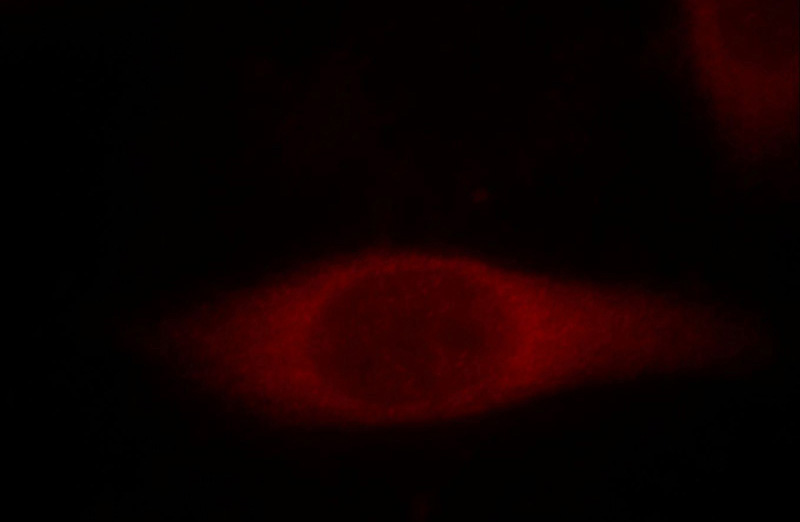
Immunofluorescent analysis of Hela cells, using NFKBIA antibody Catalog No:111639 at 1:25 dilution and Rhodamine-labeled goat anti-rabbit IgG (red).
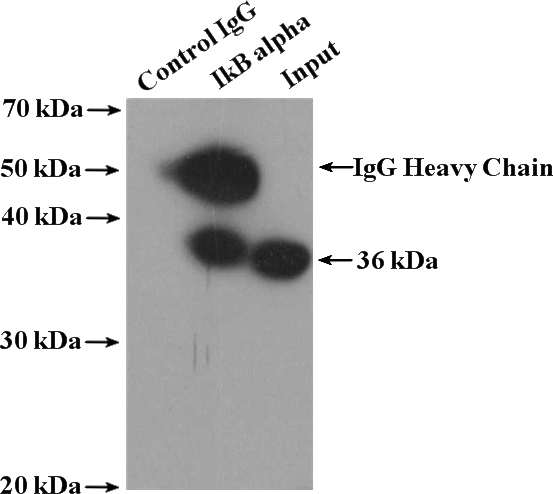
IP Result of anti-NFKBIA (IP:Catalog No:111639, 4ug; Detection:Catalog No:111639 1:1000) with HeLa cells lysate 4000ug.
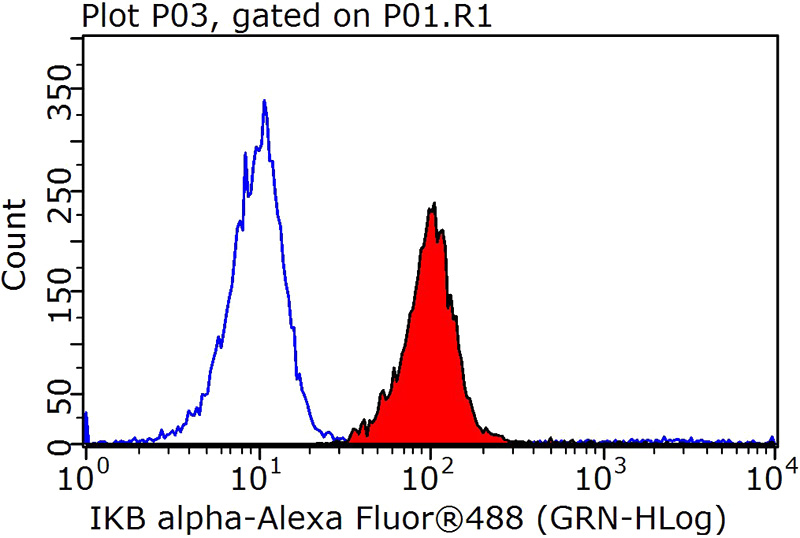
1X10^6 HeLa cells were stained with 0.2ug NFKBIA antibody (Catalog No:111639, red) and control antibody (blue). Fixed with 90% MeOH blocked with 3% BSA (30 min). Alexa Fluor 488-congugated AffiniPure Goat Anti-Rabbit IgG(H+L) with dilution 1:1000.
-
Background
Nuclear factor of kappa light polypeptide gene enhancer in B-cells inhibitor, alpha (NFKBIA, synonyms: IKBA, MAD-3, NFKBI). NFKB1 or NFKB2 is bound to REL, RELA , or RELB to form the NFKB complex. The NFKB complex is inhibited by I-kappa-B proteins (NFKBIA or NFKBIB), which inactivate NF-kappa-B by trapping it in the cytoplasm. Phosphorylation of serine residues on the I-kappa-B proteins by kinases (IKBKA, or IKBKB) marks them for destruction via the ubiquitination pathway, thereby allowing activation of the NF-kappa-B complex. Activated NFKB complex translocates into the nucleus and binds DNA at kappa-B-binding motifs such as 5-prime GGGRNNYYCC 3-prime or 5-prime HGGARNYYCC 3-prime.
-
References
- Tang S, Bao H, Zhang Y, Yao J, Yang P, Chen X. 14-3-3ε mediates the cell fate decision-making pathways in response of hepatocellular carcinoma to Bleomycin-induced DNA damage. PloS one. 8(3):e55268. 2013.
- Zhang L, Tang H, Kou Y. MG132-mediated inhibition of the ubiquitin-proteasome pathway ameliorates cancer cachexia. Journal of cancer research and clinical oncology. 139(7):1105-15. 2013.
- Luo J, Zhou H, Wang F. The hepatitis B virus X protein downregulates NF-κB signaling pathways through decreasing the Notch signaling pathway in HBx-transformed L02 cells. International journal of oncology. 42(5):1636-43. 2013.
- Li Y, Shen D, Tang X. Chlorogenic acid prevents isoproterenol-induced hypertrophy in neonatal rat myocytes. Toxicology letters. 226(3):257-63. 2014.
- Wang K, Ni L, Wang S, Zheng C. Herpes simplex virus 1 protein kinase US3 hyperphosphorylates p65/RelA and dampens NF-κB activation. Journal of virology. 88(14):7941-51. 2014.
- Shi X, Chen G, Liu X. Scutellarein inhibits cancer cell metastasis in vitro and attenuates the development of fibrosarcoma in vivo. International journal of molecular medicine. 35(1):31-8. 2015.
- Wang F, Yang JL, Yu KK. Activation of the NF-κB pathway as a mechanism of alcohol enhanced progression and metastasis of human hepatocellular carcinoma. Molecular cancer. 14:10. 2015.
- Liu M, Xu L, Yin L. Potent effects of dioscin against obesity in mice. Scientific reports. 5:7973. 2015.
Related Products / Services
Please note: All products are "FOR RESEARCH USE ONLY AND ARE NOT INTENDED FOR DIAGNOSTIC OR THERAPEUTIC USE"
